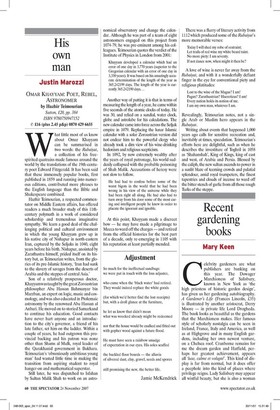His own man
Justin Marozzi OMAR KHAYYAM: POET, REBEL, ASTRONOMER by Hazhir Teimourian Sutton, £20, pp. 384 ISBN 9780750947152 £16 (plus 2.45 p&p) 0870 429 6655 What little most of us know about Omar Khayyam can be summarised in two words: the Rubaiyat, a collection of his freespirited quatrains made famous around the world by the translations of the 19th-century poet Edward Fitzgerald. It has been said that these immensely popular books, first published in 1859 and running into numerous editions, contributed more phrases to the English language than the Bible and Shakespeare combined.
Hazhir Teimourian, a respected commentator on Middle Eastern affairs, has offered readers a much broader study of this 11thcentury polymath in a work of considered scholarship and tremendous imaginative sympathy. We learn a good deal of the challenging political and cultural environment in which the young Khayyam grew up in his native city of Nishapur in north-eastern Iran, captured by the Seljuks in 1040, eight years before his birth. Nishapur, anointed by Zarathustra himself, prided itself on its history but, as Teimourian writes, from the glories of its pre-Islamic history, 'Iran had sunk to the slavery of savages from the deserts of Arabia and the steppes of central Asia.'
Son of a relatively prosperous doctor, Khayyamwas taught by the great Zoroastrian philosopher Abu Hassan Bahmanyar bin Marzban, an expert on logic, music and cosmology, and was also educated in Ptolemaic astronomy by the renowned Abu Hassan al Anbari. He moved on to storied Samarkand to continue his education. Good contacts have never hurt anyone and an introduction to the city's governor, a friend of his late father, set him on the ladder. Within a couple of years, he had outgrown this provincial backing and his patron was none other than Shams al Mulk, royal leader of the Qarakhanid government in Bukhara. Teimourian's 'obnoxiously ambitious young man' had wasted little time in making the transition from aspiring student to royal hanger-on and mathematical superstar.
Still later, he was dispatched to Isfahan by Sultan Malik Shah to work on an astronomical observatory and change the calendar. Although he was part of a team of eight astronomers engaged on this project from 1074-79, he was pre-eminent among his colleagues. Teimourian quotes the verdict of the Institute of Physics in London from 2001: Khayyam developed a calendar which had an error of one day in 3,770 years (superior to the Gregorian calendar with an error of one day in 3,330 years). It was based on his amazingly accurate determination of the length of the year as 365.242199 days. The length of the year is currently 365.242190 days...
Another way of putting it is that in terms of measuring the length of a year, he came within five seconds of the atomic clocks of today. He was 30, and relied on a sundial, water clock, globe and astrolabe for his calculations. The new calendar came into force across the Seljuk empire in 1079. Replacing the lunar Islamic calendar with a solar Zoroastrian version did not endear him to the powerful clergy who already took a dim view of his wine-drinking hedonism and religious scepticism.
In 1092, by now extremely wealthy after the years of royal patronage, his world suddenly collapsed with the probable poisoning of Shah Malik. Accusations of heresy were not slow to follow.
He had had to confess before some of the worst bigots in the world that he had been wrong in his view of the universe while they had been right all along. He had also had to turn away from his door some of the most caring and intelligent people he knew in order to placate the ignorant and ignoble.
At this point, Khayyam made a discreet bow — he may have made a pilgrimage to Mecca to ward off the charges — and retired from the official histories for the best part of a decade, only re-emerging in 1105 with his reputation at least partially mended.
There was a flurry of literary activity from 1112 which produced some of the Rubaiyat's more memorable verses: Today I will shed my robe of restraint; Let trails of red wine my white beard taint. No more piety: I am seventy.
If not dance now, when might it then be?
A love of wine is never far away from the Rubaiyat, and with it a wonderfully defiant finger in the eye for conventional piety and religious platitudes: Lost to the wine of the Magus? I am! Pagan? Zarathustrian? Haereticus? I am! Every nation holds its notion of me. I am my own man, whatever I am.
Revealingly, Teimourian notes, not a single Arab or Muslim hero appears in the Rubaiyat.
Writing about events that happened 1,000 years ago calls for sensitive recreation and, inevitably at times, speculation. Teimourian's efforts here are delightful, such as when he describes the investiture of Toghril in 1058 as `Shahanshah', King of Kings, king of east and west, of Arabia and Persia. Blessed by the caliph, the new sultan ascends to power in a sunlit blaze of teeming crowds and palatial splendour, amid royal trumpeters, the finest tapestries and clouds of incense to ward off the bitter stench of garlic from all those rough Turks of the steppe.






































































 Previous page
Previous page